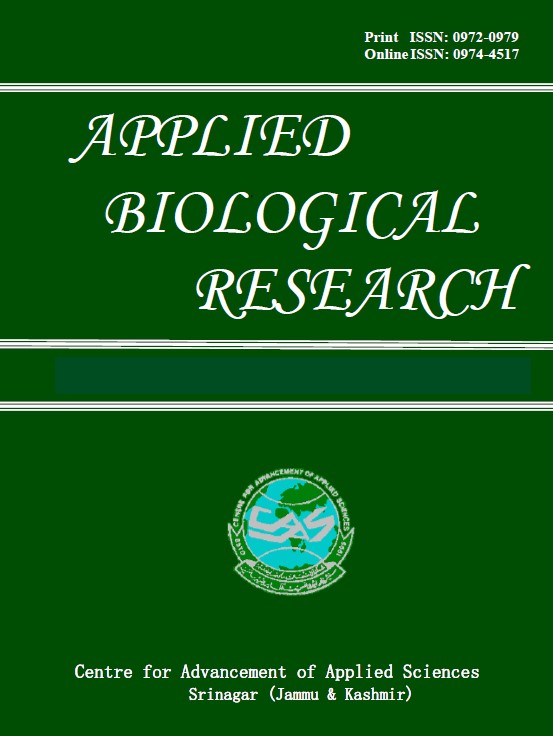DIRECT PCR-RFLP BASED SPECIES IDENTIFICATION OF INDIAN WILD CARNIVORES BY NON-INVASIVE SAMPLING
DOI:
https://doi.org/10.48165/Keywords:
Carnivores, forensic, markers, mtDNA, PCR-RFLP, scatology, speciation, sympatricAbstract
In field conditions such as forest ranges, movement corridors or in areas prone to man animal conflict very often the only evidence/specimens available for investigation are animal scat, fur, hairs, epidermis, etc. Since animal scat contains denuded intestinal epithelial cells it can provide genetic material which can be used for further analysis and other downstream studies. In present study surface scrapings from faecal samples of 5 different carnivore species viz., tiger (Panthera tigris), lion (P. leo), leopard (P. pardus), domestic dog (Canis familiaris) and domestic cat (Felis catus) were collected for DNA extraction using standard kit based protocols. A fragment of 16S rRNA gene of mitochondrial DNA was amplified using specific primers. The amplicons generated were subjected to restriction digestion. Species identification and differentiation was done using fragment length polymorphism (PCR-RFLP). The results depicted the utility and effectiveness of molecular scatology based PCR-RFLP technique for identification of wild carnivore species in forensic investigations. The observations also highlighted the potential of highly conserved mitochondrial DNA markers like 16SrRNA gene to be employed for species identification and differentiation of wild carnivores.
Downloads
References
Bottero, M.T., Civera, T., Nucara, D. and Rossti, S. 2003. Suitability of whole genome techniques for species discrimination. International Dairy Journal, 13: 277-282.
Branicki, W., Kupeiec, T. and Pawlowskii, R. 2003. Validation of cytochrome b sequence analysis as a method of species identification. Journal of Forensic Science, 9: 31-33.
Cossios, D. and Beruard, A. 2006. Identification of Andean felid faeces using PCR-RFLP. Mastozoologia Neotropical, 13(2): 239-244.
Flagstad, O., Roed, K., Stacy, J.E., and Jakobsen, K.S. 1999. Reliable non-invasive genotyping based on excremental PCR of nuclear DNA purified with magnetic bead protocol. Molecular Ecology, 8: 879-883.
Goosens, B. and Lynn, M.S. 2013. Advances and difficulties of molecular tools for carnivore conservation in the tropics. The Raffles Bulletin, 28: 43-53.
Hoss, M., Kohn, M., Paabo, S., Knauer, F. and Schroder, W. 1992. Excrement analysis by PCR. Nature, 359(39): 199-200.
Kitano, T., Umetsa, K., Tian, W. and Osawa, M. 2007. Two universal primer sets for species identification among vertebrates. International Journal of Legal Medicine, 121: 423-427.
PCR-RFLP based species identification of Indian wild carnivores 529
Laguardia, A., Wang, J., Shi, F.L., Shi, K., and Riordan, P. 2015. Species identification refined by molecular scatology in a community of sympatric carnivores in Xinjiang, China. Zoological Research, 36(2): 72-78.
Linnaeus, C. 1758. Systema naturae per regna tria naturae, secundum classes, ordines, genera, species, cum characteribus, differentiis, synonymis, locis (in Latin). 10th revised edition. Laurentius Salvius, Stockholm. p. 824.
Lucchini, V., Fabbri, E. and Marucco, F. 2002. Non-invasive molecular tracking of colonizing wolf (Canis lupus) packs in the western Italian alps. Molecular Ecology, 11: 857-868. Mcelwee, B. 1998. The Use of Molecular Scatology to Study River Otter Genetics. Master’s thesis, Rochester Institute of Technology, New York, USA.
Mills, L.S., Citta, J.J., Lair, K., Schwartz, M. and Tallmon, D. 2000. Estimating animal abundance using non-invasive DNA sampling: Promise and pitfalls. Ecological Applications, 10: 283-294. Mukherjee, S., Ashalakshmi, C.N., Home, C. and Ramakrishnan, U. 2010. An evaluation of the PCR RFLP technique to aid molecular-based monitoring of felids and canids in India. BMC Research Notes, 3: 159-166.
Palomeres, F., Godoy, J.A., Piriz, A., O’ brien, S.J. and Johnson, W.E. 2002. Faecal genetic analysis to determine the presence and distribution of elusive carnivores: Design and feasibility for Iberian lynx. Molecular Ecology, 11(10): 2171-2182.
Paxinos, E., McIntosh, E., Ralls, K. and Fleisher, R. 1997. A non-invasive method of distinguishing among canid species: Amplification and enzyme restriction of DNA from dung. Molecular Ecology, 6: 483-486.
Pocock, R.I. 1917. The classification of existing felidae. Journal of Natural History, 20(19): 329-350. Rastogi, G., Dhame, P., Walujkar, M.S. and Kumar, S. 2007. Evaluation of genetic markers. Meat Science, 76: 666-674.
Reed, J.Z., Tollit, D.J., Thompson, P.M. and Amos, W. 1997. Molecular scatology: The use of molecular genetic analysis to assign species, sex and individual identity to scat faeces. Molecular Ecology, 6: 225-234.
Wasser, S.K., Houston, C.S., Kochler, G.M., Cadd, G.G. and Fain, S.R. 1997. Techniques for application of faecal DNA methods to field study of Ursids. Molecular Ecology, 6: 1091-1097.

